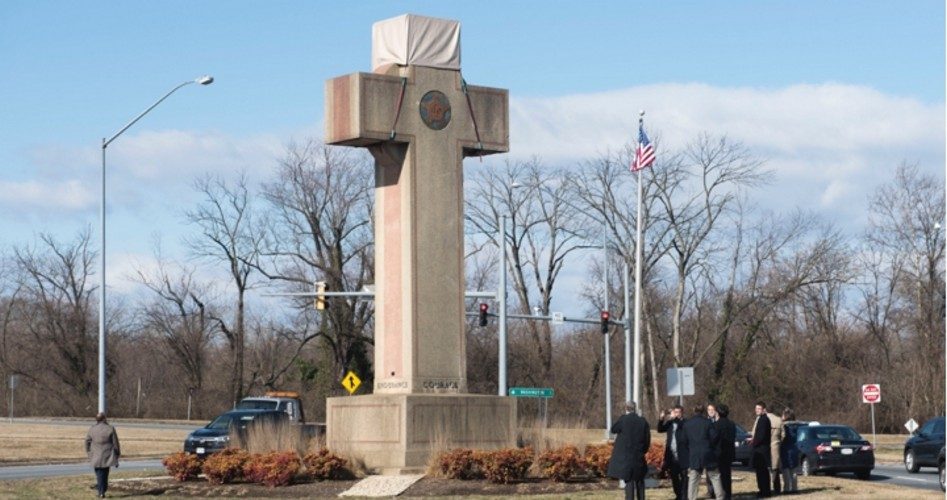
In a highly anticipated case, the U.S. Supreme Court has ruled that Maryland’s 40-foot “Peace Cross” memorial does not violate the First Amendment’s Establishment Clause, which states that “Congress shall make no law respecting an establishment of religion.”
On June 20 the U.S. Supreme Court ruled that the 40-foot-tall “Peace Cross” memorial in Bladensburg, Maryland, erected in 1925 by the American Legion to memorialize the 49 soldiers from Prince George’s County who died during World War I, can maintain its place of prominence on government property.
In 2014 the secularist American Humanist Association (AHA) sued to have the memorial removed from land owned by the state of Maryland, charging that it represented a violation of the First Amendment’s supposed separation of religion and government requirement. A year later Maryland’s U.S. District Court ruled in favor of the monument, finding that despite its cross shape, its purpose was not primarily religious and thus was not in violation of the First Amendment’s Establishment Clause.
But in 2017, a three-judge panel of the U.S. Court of Appeals for the 4th Circuit overturned the lower court, ruling 2-1 that the memorial amounts to an unacceptable endorsement of Christianity and must come down.
The case was appealed to the Supreme Court by the sate of Maryland and the American Legion, which warned that the 4th Circuit’s ruling could jeopardize countless similar cross-shaped war memorials, such as the 24-foot Canadian Cross of Sacrifice and the 13-foot Argonne Cross, both which have stood in Arlington National Cemetery for generations.
In its 7-2 decision in favor of the Bladensburg monument, the Supreme Court reversed the 4th Circuit Court’s ruling, acknowledging that historic significance of the memorial outweighed any potential First Amendment issues.
“The cross is undoubtedly a Christian symbol, but that fact should not blind us to everything else that the Bladensburg Cross has come to represent,” wrote Associate Justice Samuel Alito for the majority. “For some, that monument is a symbolic resting place for ancestors who never returned home. For others, it is a place for the community to gather and honor all veterans and their sacrifices for our Nation. For others still, it is a historical landmark.”
Alito observed that “when time’s passage imbues a religiously expressive monument, symbol, or practice with this kind of familiarity and historical significance, removing it may no longer appear neutral, especially to the local community for which it has taken on particular meaning. A government that roams the land, tearing down monuments with religious symbolism and scrubbing away any reference to the divine will strike many as aggressively hostile to religion.”
Added Alito: “That the cross originated as a Christian symbol and retains that meaning in many contexts does not change the fact that the symbol took on an added secular meaning when used in World War I memorials.”
Alito was joined in the majority ruling by Chief Justice John Roberts and Associate Justices Clarence Thomas, Stephen Breyer, Elena Kagan, Neil Gorsuch and Brett Kavanaugh. Dissenting in the ruling were Associate Justices Ruth Bader Ginsburg and Sonia Sotomayor.
In a concurring opinion, Justice Stephen G. Breyer wrote that while there is sufficient reason to allow the Maryland cross to remain, other, newer memorials with religious symbolism may be problematic. “The case would be different, in my view, if there were evidence that the organizers had ‘deliberately disrespected’ members of minority faiths or if the Cross had been erected only recently, rather than in the aftermath of World War I,” Breyer wrote. “A newer memorial, erected under different circumstances, would not necessarily be permissible under this approach.”
Similarly, Justice Kavanaugh wrote: “I fully understand the deeply religious nature of the cross. It would demean both believers and nonbelievers to say that the cross is not religious, or not all that religious. A case like this is difficult because it represents a clash of genuine and important interests.”
He added that the ruling that “the cross does not violate the Establishment Clause does not necessarily mean that those who object to it have no other recourse. The court’s ruling allows the state to maintain the cross on public land. The court’s ruling does not require the state to maintain the cross on public land.”
In the dissenting opinion, Ginsburg wrote: “Just as a Star of David is not suitable to honor Christians who died serving their country, so a cross is not suitable to honor those of other faiths who died defending their nation. Soldiers of all faiths ‘are united by their love of country, but they are not united by the cross.’”
Kelly Shackelford of First Liberty Institute, which represented the American Legion in its Supreme Court appeal, applauded the ruling, calling it “a landmark victory for religious freedom. The days of illegitimately weaponizing the Establishment Clause and attacking religious symbols in public are over. Our Founders would have been appalled at this attempt to make the government hostile to our religious heritage, history, and symbols. The attempted perversion of our Constitution is now over, and every American now has more freedom than they have had in decades, with a government no longer hostile to people or expressions of faith.”
Shackelford noted that over the past 50 years the notorious Lemon test, used to decide whether or not a law violates the First Amendment, has been employed to attack veterans’ memorials, Nativity scenes, and other religiously themed symbols. However, he said, “the Lemon test is not useful in this context, it’s not helpful. We are a country that has a religious heritage and history, so you’re going to see monuments that are secular and those that are religious.”
David Cortmann, senior counsel for Alliance Defending Freedom, also applauded the ruling, observing that “a passive monument like the Bladensburg Cross, which celebrates those who died to defend our Constitution and acknowledges our nation’s religious heritage, simply does not amount to an establishment of religion.”
Following the ruling against its interest, the American Humanist Association vowed to double down in its efforts to limit the freedom of Americans to express their religious faith in public. “In the face of today’s decision, we must all pursue new avenues to bolster the First Amendment,” declared AHA spokesman Roy Speckhardt. “Our legislative efforts will be redoubled as the American Humanist Association works to strengthen the wall of separation between church and state, brick by brick. And in the interim, our legal team will do what it can to narrow the breadth of this decision in courtrooms across the country.”
Photo of the “Peace Cross” memorial in Bladensburg, Maryland: AP Images


